 ★★★★
★★★★
“Mechanical Pixie Dream Girl.”
 Depending on your definition, this is perhaps the most expensive action-heroine film of all time, estimated at more than $200 million before tax incentives. Given the fate of live-action adaptations of manga in the West, most recently Ghost in the Shell, this was always going to be a risky investment, even with the name of James Cameron, the most successful movie-maker in history, attached as a producer. At one point, people were predicting a bomb of Mortal Engines size. While Alita seems to have escaped that fate, it’s going to have to do very well in both China and Japan, the two remaining territories, if it’s to turn any kind of profit, never mind start a franchise.
Depending on your definition, this is perhaps the most expensive action-heroine film of all time, estimated at more than $200 million before tax incentives. Given the fate of live-action adaptations of manga in the West, most recently Ghost in the Shell, this was always going to be a risky investment, even with the name of James Cameron, the most successful movie-maker in history, attached as a producer. At one point, people were predicting a bomb of Mortal Engines size. While Alita seems to have escaped that fate, it’s going to have to do very well in both China and Japan, the two remaining territories, if it’s to turn any kind of profit, never mind start a franchise.
 That’s a shame, because this is a solid, well-made piece of science-fiction, which does a particularly good job of creating a massive, epic world on the cinema screen. Rodriguez has been squeezing every penny out of his budgets since El Mariachi, and while there may not be much apparent overlap between Alita with Shark Boy and Lava Girl, the latter franchise was excellent training for RR in meshing computer graphics with actors. Sin City also laid similar groundwork, and helped set up the director with the chance to go big or go home. And there’s no doubt: Rodriguez went big. This was my first cinema trip of 2019, and was fully justified.
That’s a shame, because this is a solid, well-made piece of science-fiction, which does a particularly good job of creating a massive, epic world on the cinema screen. Rodriguez has been squeezing every penny out of his budgets since El Mariachi, and while there may not be much apparent overlap between Alita with Shark Boy and Lava Girl, the latter franchise was excellent training for RR in meshing computer graphics with actors. Sin City also laid similar groundwork, and helped set up the director with the chance to go big or go home. And there’s no doubt: Rodriguez went big. This was my first cinema trip of 2019, and was fully justified.
Having recently read the original manga, I was struck by how faithful the film was to most aspects. Right from the get-go, with Doc Ido (Waltz) finding the shattered remains of Alita (Salazar) on the scrap-heap below Zalem, there were shots which could have been story-boarded by the graphic novel. [Again, something Rodriguez also did in Sin City] Ido, in particular, looks exactly like I imagined him, and the same goes for Vector (Mahershala Ali), the shady power behind the scenes in Iron City, as well as Zapan and the rest of the bounty hunters.
The story is generally quite faithful, too. After her rescue, Alita tries to recover her past memories, becomes a bounty-hunter, falls in love with human boy Hugo (Johnson), takes up the brutal sport of Motorball, and experiences personal tragedy. However, the order of the events is shifted: in the manga, the tragedy is what spurs her entry into the Motorball arena. The film also adds Ido’s ex-wife, Chiren (Connolly), a character who was not in the comics, though does appear in the OVA. Here, they had a disabled daughter named Alita, who was killed by one of Ido’s Motorball goons. It’s a rather clunky subplot, which doesn’t add particularly much, beyond explaining from where Alita v2.0’s body came.
There has been much debate over Alita’s eyes, which have been CGI-increased in size to an extent rarely if ever seen in a live-action film. Of course, she’s a cyborg, so whatever. However, it is still something of a distraction, even though it appears they’ve been toned-down in size from early trailers, where it appeared her eyeballs would have occupied most of her brain’s frontal lobe. The eyes are one of the hardest things to get right with computer graphics, and when it isn’t, the results can be horrible, as with the resurrected Peter Cushing in Rogue One. This is better, and at some moments does enhance things, basically acting as a megaphone for Alita’s feelings. However, it also plays into the film’s main weakness: an apparent lack of genuine emotion. I’ll circle back to that a bit later.
As a spectacle, this is grand, offering sweeping vistas of a future world, densely populated with people, things and those in between. As an action movie, it works pretty well too. The two best set-pieces are the bar-brawl where newly-registered bounty hunter Alita proves her worth to her colleagues, and the Motorball game, where everyone else taking part cares only about killing Alita. There’s a palpable sense of progression in her skills over the course of the film. Initially, she’s clearly raw and unfocused, but after she is paired with her “berserker” body… [Inevitably, it has been the subject of PC whining, about it looking ‘too feminine’] Hoo-boy. By the end, she’s a weapon on mass destruction, regardless of the opponent’s size.
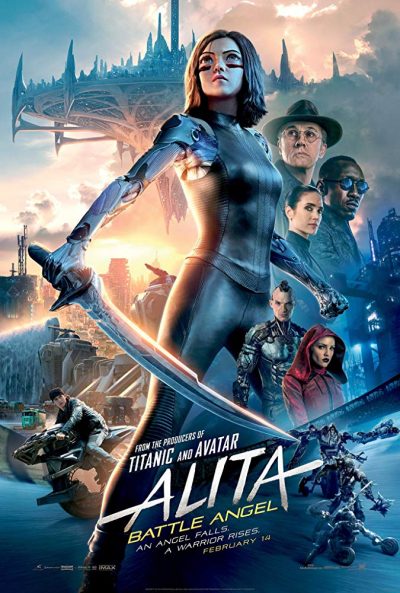 And speaking of the end, one frequently-heard bit of criticism is that the ending is too “open,” apparently fishing for a sequel. I can’t say I felt that way at all. There’s certainly scope for more movies, apparently involving Alita going after the mysterious Nova. Yet the main thread of the film, involving Alita and Hugo, is definitively wrapped up. In comparison, say, to Marvel films, which almost inevitably have an in- or post-credit sequence blatantly signposting the next film, this felt conclusive. While there is perhaps need for a greater sense of escalation, or a bigger climax (that Motorball battle is trivial in its consequences), I’m largely baffled by complaints about the “lack of a genuine ending.”
And speaking of the end, one frequently-heard bit of criticism is that the ending is too “open,” apparently fishing for a sequel. I can’t say I felt that way at all. There’s certainly scope for more movies, apparently involving Alita going after the mysterious Nova. Yet the main thread of the film, involving Alita and Hugo, is definitively wrapped up. In comparison, say, to Marvel films, which almost inevitably have an in- or post-credit sequence blatantly signposting the next film, this felt conclusive. While there is perhaps need for a greater sense of escalation, or a bigger climax (that Motorball battle is trivial in its consequences), I’m largely baffled by complaints about the “lack of a genuine ending.”
As mentioned above, a more significant issue is that I hardly “felt” anything for any of the characters. Ido – stuck between paternal instincts of protection and a desire to allow Alita self-determination – perhaps came the closest. The relationship between Alita and Hugo is supposed to provide the film’s emotional engine. But between the former’s CGI make-up and the latter’s generic blandness, it doesn’t make much of a dent. There’s a scene where she literally tears out her heart and gives it to him: everyone, including the film itself, seems faintly embarrassed by the whole incident. Worse still – minor spoiler – the movie even goes so far as to kill a dog, without generating more than a blip of impact. Somewhere, John Wick shakes his head, sadly.
I was initially concerned about the PG-13 rating – not least because the first trailer before the film was for UglyDolls [an animated movie “about acceptance, diversity, joy and friendship” according to its site]. I needn’t have been: this is more From Dusk Till Dawn Robert Rodriguez than the Spy Kids version, with a gleeful approach to the semi-mechanized carnage. For I think it helps on the censorship front, that most of the carnage in inflicted on cyborgs, who are largely able to take a licking and keep on ticking. The manga was heavily into black market spine-ripping; here, it’s mostly limbs, which is slightly more kid-friendly, I guess.
In the end, this is just about everything for which I could have hoped. While I don’t necessarily agree with all of the artistic choices, the positives greatly outweigh the weaknesses. Although this is a low bar (hello, Speed Racer), it’s certainly the best manga/anime adaptation to come out of Hollywood. It’s a world I’d love to see explored further: whether Rodriguez and crew get the chance to do so or not, will remain in doubt until the final box-office figures arrive. Fingers crossed.
Dir: Robert Rodriguez
Star: Rosa Salazar, Christoph Waltz, Keean Johnson, Jennifer Connelly
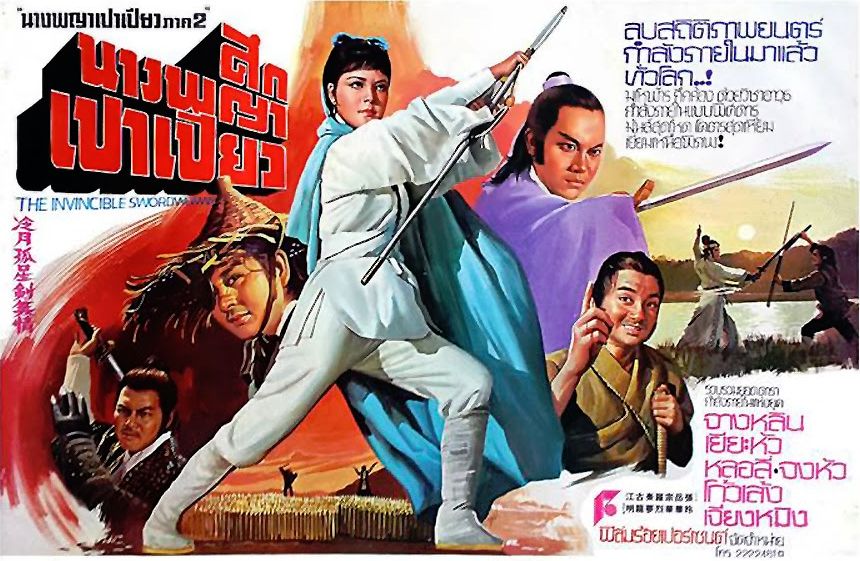 We’ve previously written about Pearl Ling Chang’s mad Wolf Devil Woman: this is considerably more straightforward, yet is perhaps the better for it. The villain is General Ma Tang, who is imposing a brutal reign of terror on the region under his control, largely through his masked band of kung-fu masters. He ruthlessly takes out all those who oppose him, leaving the country in a state of fear. There remains a small band of rebels, who have evidence of Tang’s misconduct, but need someone who can take it to the authorities. The leading candidate is Pai Yu Song (Chang), a woman whose father was one of Tang’s victims, so has every reason to help, and whose martial arts skills are legendary.
We’ve previously written about Pearl Ling Chang’s mad Wolf Devil Woman: this is considerably more straightforward, yet is perhaps the better for it. The villain is General Ma Tang, who is imposing a brutal reign of terror on the region under his control, largely through his masked band of kung-fu masters. He ruthlessly takes out all those who oppose him, leaving the country in a state of fear. There remains a small band of rebels, who have evidence of Tang’s misconduct, but need someone who can take it to the authorities. The leading candidate is Pai Yu Song (Chang), a woman whose father was one of Tang’s victims, so has every reason to help, and whose martial arts skills are legendary.




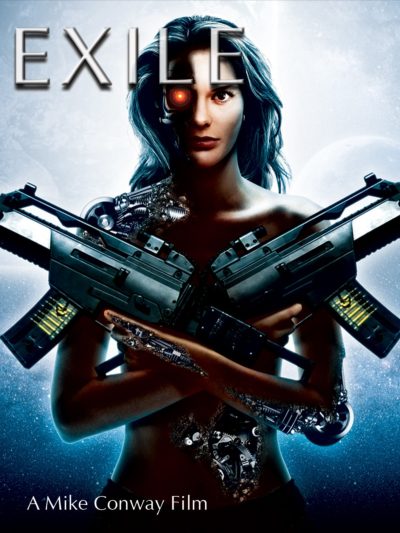 Space freighter pilot Jason (Sheridan) has his craft hijacked, and is forced to crash-land it on a deserted planet. Blinded and alone, things look grim for him, until he’s fortunate enough to be found by android Reyna (Guzzetta). She’s the product of a maverick genius, who took refuge on the planet, but recently died: she needs Jason, as the systems which power her require a human presence in order to operate. And he needs her – in particular, her advanced combat skills – in order to protect him, both from the planet’s hostile fauna, and the hijacker’s pals, who have followed him down to its surface. Yet, is Reyna entirely trustworthy?
Space freighter pilot Jason (Sheridan) has his craft hijacked, and is forced to crash-land it on a deserted planet. Blinded and alone, things look grim for him, until he’s fortunate enough to be found by android Reyna (Guzzetta). She’s the product of a maverick genius, who took refuge on the planet, but recently died: she needs Jason, as the systems which power her require a human presence in order to operate. And he needs her – in particular, her advanced combat skills – in order to protect him, both from the planet’s hostile fauna, and the hijacker’s pals, who have followed him down to its surface. Yet, is Reyna entirely trustworthy?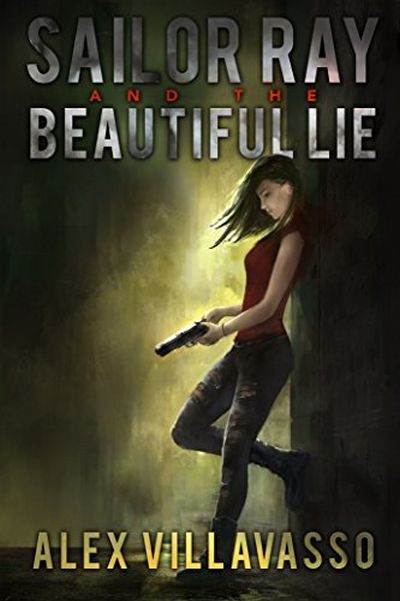 This got off to a frankly rocky start, to the point that a few pages in, this felt like it might become a very rare DNF (Did Not Finish) book. It’s an incredibly clumsy and stilted opening, depicting the internal conversation between Sailor Ray and the demon who inhabits her. Literally, “Why am I reading this?” bad. Still, I persisted: and in the end, the story redeemed itself, though the final third was considerably weaker overall.
This got off to a frankly rocky start, to the point that a few pages in, this felt like it might become a very rare DNF (Did Not Finish) book. It’s an incredibly clumsy and stilted opening, depicting the internal conversation between Sailor Ray and the demon who inhabits her. Literally, “Why am I reading this?” bad. Still, I persisted: and in the end, the story redeemed itself, though the final third was considerably weaker overall.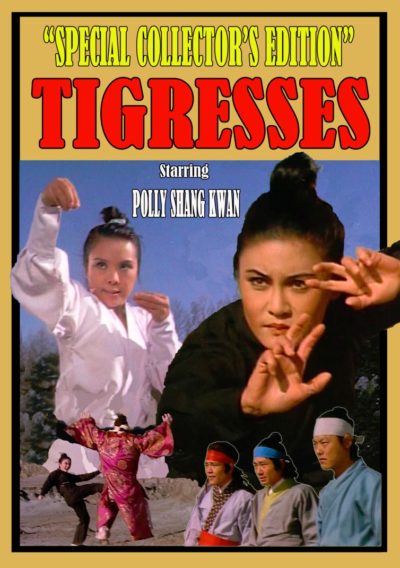 After their parents are killed by Ji-Gyeum Yoon (Kim Y-i), who wants to take over their father Sung’s position, sisters Su-Yung and An-Yung are split up and sent off for their safely, each owning half of a jade pendant. Fifteen years later, An-Yung (Shang Kwan) begins to take her vengeance on the usurper – not just physically, but also waging psychological warfare, sending him notes to ensure he knows he is being targeted, although not initially why or who. Though I’m a little surprised Yoon doesn’t figure it out immediately, given he’s still so paranoid about Sung’s daughters coming out, he freaks out when left alone with a maid, stating the position given in the tag-line above.
After their parents are killed by Ji-Gyeum Yoon (Kim Y-i), who wants to take over their father Sung’s position, sisters Su-Yung and An-Yung are split up and sent off for their safely, each owning half of a jade pendant. Fifteen years later, An-Yung (Shang Kwan) begins to take her vengeance on the usurper – not just physically, but also waging psychological warfare, sending him notes to ensure he knows he is being targeted, although not initially why or who. Though I’m a little surprised Yoon doesn’t figure it out immediately, given he’s still so paranoid about Sung’s daughters coming out, he freaks out when left alone with a maid, stating the position given in the tag-line above.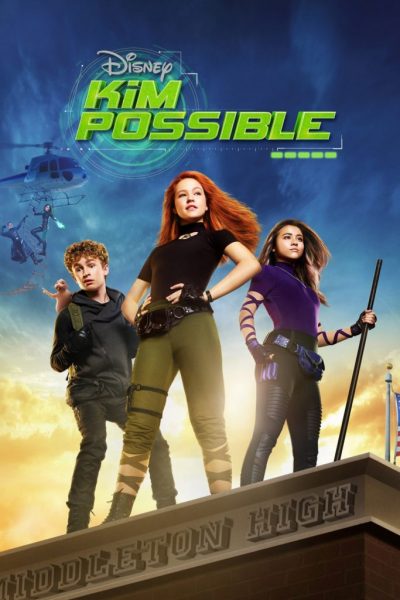 The new trend for Disney appears to be, live-action version of their beloved classic movies. This year alone, we can expect to see Dumbo, Aladdin and The Lion King, with Mulan to follow in 2020. A possible stalking horse for this was the live-action version of (somewhat) beloved TV series, Kim Possible, which ran for four seasons from 2002-07. It was pretty good, likely peaking with TV movie
The new trend for Disney appears to be, live-action version of their beloved classic movies. This year alone, we can expect to see Dumbo, Aladdin and The Lion King, with Mulan to follow in 2020. A possible stalking horse for this was the live-action version of (somewhat) beloved TV series, Kim Possible, which ran for four seasons from 2002-07. It was pretty good, likely peaking with TV movie 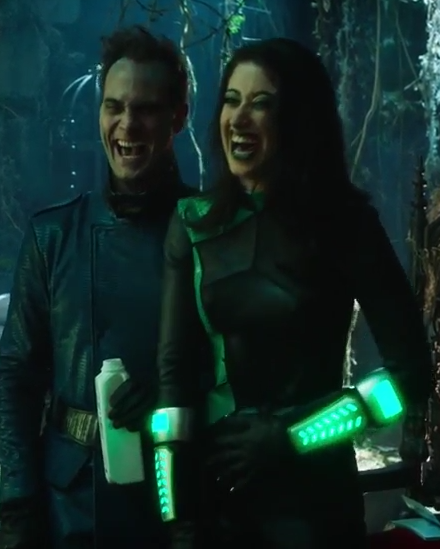 Instead, however, there’s a really horrible plot about Kim befriending Athena (Wilson), another new student. I’m sorry, when did Kim Possible become a relationship drama? Jealousy of Athena – despite her being super-annoying – causes Kim to suffer self-doubt, and fail when she is needed most… blah blah blah. Awful scripting, the portrayal of their relationship is sub-juvenile pap, which I’m sure would turn the stomach of any actual high-schooler. Worse, it goes beyond “flawed”, making the heroine weak and no longer heroic. And what’s with Kim being obsessed with joining the school’s soccer team? She was a
Instead, however, there’s a really horrible plot about Kim befriending Athena (Wilson), another new student. I’m sorry, when did Kim Possible become a relationship drama? Jealousy of Athena – despite her being super-annoying – causes Kim to suffer self-doubt, and fail when she is needed most… blah blah blah. Awful scripting, the portrayal of their relationship is sub-juvenile pap, which I’m sure would turn the stomach of any actual high-schooler. Worse, it goes beyond “flawed”, making the heroine weak and no longer heroic. And what’s with Kim being obsessed with joining the school’s soccer team? She was a  ★★★★
★★★★ Depending on your definition, this is perhaps the most expensive action-heroine film of all time, estimated at more than $200 million before tax incentives. Given the fate of live-action adaptations of manga in the West, most recently
Depending on your definition, this is perhaps the most expensive action-heroine film of all time, estimated at more than $200 million before tax incentives. Given the fate of live-action adaptations of manga in the West, most recently  That’s a shame, because this is a solid, well-made piece of science-fiction, which does a particularly good job of creating a massive, epic world on the cinema screen. Rodriguez has been squeezing every penny out of his budgets since El Mariachi, and while there may not be much apparent overlap between Alita with Shark Boy and Lava Girl, the latter franchise was excellent training for RR in meshing computer graphics with actors. Sin City also laid similar groundwork, and helped set up the director with the chance to go big or go home. And there’s no doubt: Rodriguez went big. This was my first cinema trip of 2019, and was fully justified.
That’s a shame, because this is a solid, well-made piece of science-fiction, which does a particularly good job of creating a massive, epic world on the cinema screen. Rodriguez has been squeezing every penny out of his budgets since El Mariachi, and while there may not be much apparent overlap between Alita with Shark Boy and Lava Girl, the latter franchise was excellent training for RR in meshing computer graphics with actors. Sin City also laid similar groundwork, and helped set up the director with the chance to go big or go home. And there’s no doubt: Rodriguez went big. This was my first cinema trip of 2019, and was fully justified. And speaking of the end, one frequently-heard bit of criticism is that the ending is too “open,” apparently fishing for a sequel. I can’t say I felt that way at all. There’s certainly scope for more movies, apparently involving Alita going after the mysterious Nova. Yet the main thread of the film, involving Alita and Hugo, is definitively wrapped up. In comparison, say, to Marvel films, which almost inevitably have an in- or post-credit sequence blatantly signposting the next film, this felt conclusive. While there is perhaps need for a greater sense of escalation, or a bigger climax (that Motorball battle is trivial in its consequences), I’m largely baffled by complaints about the “lack of a genuine ending.”
And speaking of the end, one frequently-heard bit of criticism is that the ending is too “open,” apparently fishing for a sequel. I can’t say I felt that way at all. There’s certainly scope for more movies, apparently involving Alita going after the mysterious Nova. Yet the main thread of the film, involving Alita and Hugo, is definitively wrapped up. In comparison, say, to Marvel films, which almost inevitably have an in- or post-credit sequence blatantly signposting the next film, this felt conclusive. While there is perhaps need for a greater sense of escalation, or a bigger climax (that Motorball battle is trivial in its consequences), I’m largely baffled by complaints about the “lack of a genuine ending.”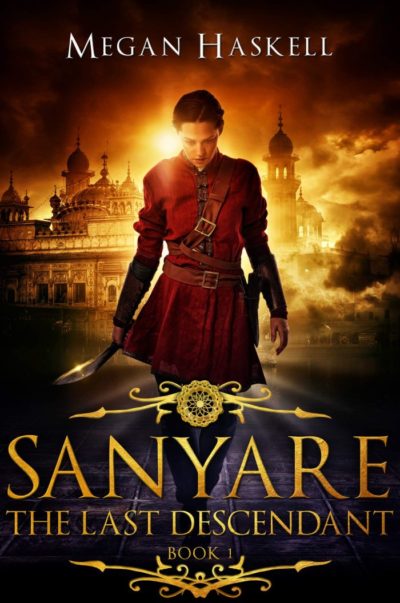 Nuriel Lhethannien, known as Rie, is an orphan human in a multi-verse, populated by elves, vampires known as sidhes, trolls and a host of other magic creatures. She has a job as a messenger for King Othin, the ruler of the Upper Realm. But when she’s attacked by assassins from the Shadow Realm, she’s in deep trouble. For such is the enmity between the realms, that Othin decreed, “Anyone in contact with the Shadow Realm, in any way, would be executed.” To save her own life, Rie has to become even more of an outlaw, and journey down below, seeking to find the truth about who attacked her and why.
Nuriel Lhethannien, known as Rie, is an orphan human in a multi-verse, populated by elves, vampires known as sidhes, trolls and a host of other magic creatures. She has a job as a messenger for King Othin, the ruler of the Upper Realm. But when she’s attacked by assassins from the Shadow Realm, she’s in deep trouble. For such is the enmity between the realms, that Othin decreed, “Anyone in contact with the Shadow Realm, in any way, would be executed.” To save her own life, Rie has to become even more of an outlaw, and journey down below, seeking to find the truth about who attacked her and why.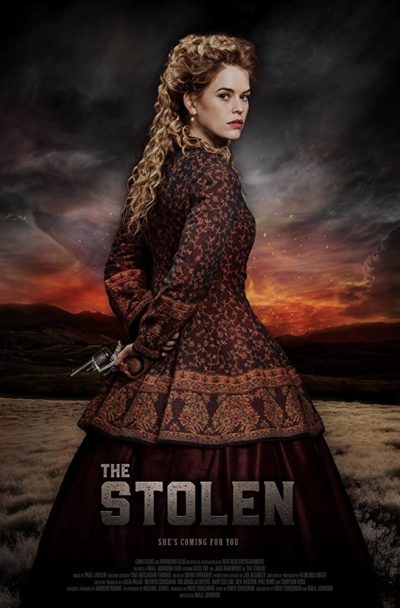 Rarely has such promise been so spectacularly and vigorously squandered. For this starts well enough. In 19th century New Zealand, English ex-pat Charlotte (Eve) is settling into a new life with her husband and newborn child. This is upturned when a midnight raid leaves her husband dead and the baby kidnapped. Months later, after everyone else has moved on, she gets a ransom demand in the mail, and she tracks its source to Goldtown. This remote outpost is truly an Antipodean version of the Wild West, a rough-edged mining town run by Joshua McCullen (Davenport). Braving all manner of threats – not least, that the only other women there are prostitutes – Charlotte makes the perilous journey to the frontier settlement in search of her son.
Rarely has such promise been so spectacularly and vigorously squandered. For this starts well enough. In 19th century New Zealand, English ex-pat Charlotte (Eve) is settling into a new life with her husband and newborn child. This is upturned when a midnight raid leaves her husband dead and the baby kidnapped. Months later, after everyone else has moved on, she gets a ransom demand in the mail, and she tracks its source to Goldtown. This remote outpost is truly an Antipodean version of the Wild West, a rough-edged mining town run by Joshua McCullen (Davenport). Braving all manner of threats – not least, that the only other women there are prostitutes – Charlotte makes the perilous journey to the frontier settlement in search of her son.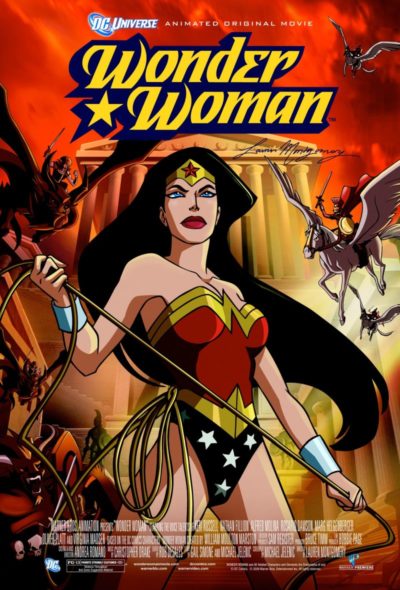 Often forgotten in the critical acclaim for the
Often forgotten in the critical acclaim for the  I’m generally an easy-going guy with regard to plots in my action heroine films. Give me adequate amounts of ass-kicking and I’ll happily overlook most weaknesses in the storyline. I mention this, to stress I’m not a nitpicky kind of reviewer, who requires an Aristotlean level of logic from their movies. So when I say, there are major problems with the scripting here… There are MAJOR problems with the scripting here.
I’m generally an easy-going guy with regard to plots in my action heroine films. Give me adequate amounts of ass-kicking and I’ll happily overlook most weaknesses in the storyline. I mention this, to stress I’m not a nitpicky kind of reviewer, who requires an Aristotlean level of logic from their movies. So when I say, there are major problems with the scripting here… There are MAJOR problems with the scripting here.